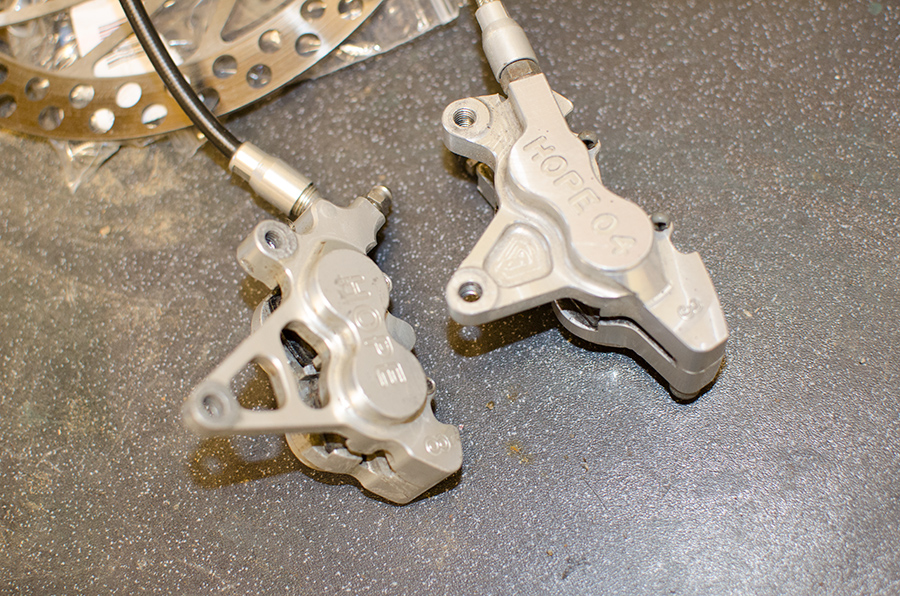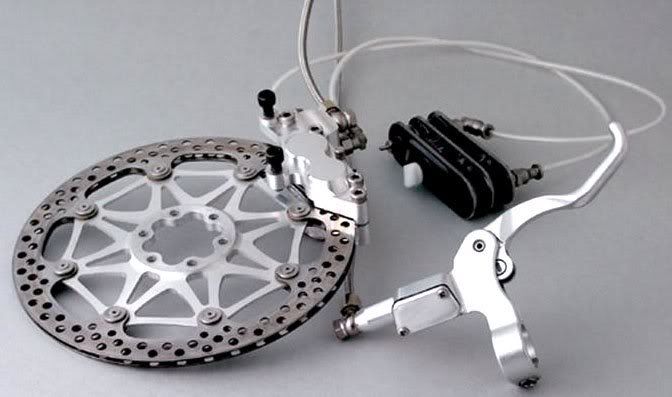❯ Evolution of Disc Brake Technology in MTB, Pushing Technology
| 09-11-2016, 12:02 PM | #1 |
|
Brigadier General
 3060
Rep 3,434
Posts |
Evolution of Disc Brake Technology in MTB, Pushing Technology
I mountain bike a lot and I'm also a brake junkie. I love big beefy brakes, whether it's slamming on them in my car, or looking at the calipers through the wheels. One of the worst things I can imagine is super fancy/high end wheels paired with dinky little calipers. Just looks funny and contradictory.
Mountain bike brakes have usually come from motorcross technology, just downsized a bit, but there are several technologies where they may be pushing the limits past what motocross or even automotive is at. In regards to my title, possibly not "superior", maybe more "different", but pushing the boundaries IMO nonetheless. Back in the day, companies like Hayes and Hope were getting everything started. These were actually the first hydraulic brakes I used, Magura HS33s. We used these before disc brakes. They were actually so powerful they'd bow-out your fork/frame, so they had to use the stiffener you see pictured. If your rim wasn't exactly straight, they would "float" a little back and forth.  I had these brakes as some of my first back in 1999:  They were alright for the time, they hadn't settled on the rotor sizes yet, so they were only 180mm for a DH brake. Another oddity was that the mounts were not standardized and different fork and frame manufacturers had different spacing. To make these fit your bike/fork, you had to order the correct "caliper half", as they were bolt-together calipers. Kind of a big pain in the butt though due to this. This was one of the first true DH brakes with all the power to back it up. The interesting feature here is it was a "floating" caliper, like you see on many automotive designs. Back when disc brakes for mtb started, warping discs due to overheating the rotor was fairly common, as was hitting the rotor on something and warping it. The floating caliper allowed the brake to still work ok with a somewhat warped rotor. This feature was never really carried over though, as rotors improved significantly. I had issues with these developing small leaks after a while, but when they worked, they had massive power.  Shimano finally got into the game with these 4-pot calipers. They built a pretty good reputation with them. The design was also shared with an Italian company.  I also had these brakes, mono-block calipers have been used on and off. The industry can't seem to make up their mind whether they want monoblock or two-halves. I believe one of the issues is that the monoblock doesn't necessarily end up stiffer when all of the material is relieved for weight savings, so the bolted calipers still seem to be prevalent from many manufacturers. Note the pinned rotors.  Shimano did some prototypes that never made it to market. This one in particular was for downhill racing. What appears to be a vented rotor is actually not, it's two rotors and 3 disc brake pads. One pad is sandwitched in between the two rotors. The brakes were also water cooled. Reports from the racers were that these brakes were far too powerful and there were other reports of them adding grease to the rotors to make them less powerful during races. MTB rotors are usually much more susceptible to contamination and even touching the rotor with your hand can result in significantly degraded performance due to the oil on your skin. This rotor is also "pinned". Some people in MTB call them "floating", but I think "pinned" is a more accurate term, as they are riveted or pinned to allow the rotor to expand freely compared to the carrier, just like is seen in motorcross or automotive applications. This feature has carried over and is common on many high end MTB systems today.  These brakes actually are vented. These are close to the current offerings by Hope, but I don't think you can get this particular one anymore. One of the reasons for this design was to compete with the next technology by Shimano, the drawback was what's essentially dual braking surfaces adds significant weight.    Shimano did a lot more research and found they could significantly reduce the temperature of the brakes/pads/rotors during long descents with a few technologies. It's important because on very steep tracks you have to be "on the brakes" heavy almost all the time and if you overheat too far, the pads glaze over and braking decreases significantly (and then you usually crash). First, they came out with these brakes that had aluminum cooling fins mounted to the pads. This is key because that's one place that heats up the most and aluminum is good at transmitting heat (which is why I use a carbon-fiber handlebar for my winter riding, because it doesn't suck so much heat away, but I digress).   The next thing they did was invent these rotors that sandwitch an aluminum layer between the two outer steel braking surface layers. Although the rotor doesn't look anything special, heat-tests revealed a significant amount of heat dissipation and cooling compared to traditional rotors.  Then they took it one step further and extended the aluminum core into fins, to further dissipate the heat.    Now we have stuff that works absolutely amazing. It's interesting how these companies have very actively tried to improve the technology over the years and reduce the braking temps, from the water cooled designs to vented to the "ice-tech" technology of cooling fins and aluminum core/finned rotors. Obviously many of these technologies wouldn't carry over or be practical in the automotive world, but as I started with, I love brakes and an fascinated by the technology improvements and evolution. Hope you enjoy!
__________________
Current: 2018 Camaro SS 1LE, 2023 Colorado ZR2. Former: BMW 428i Gran Coupe.
Last edited by RM7; 09-11-2016 at 12:09 PM.. |
| 09-11-2016, 03:04 PM | #5 |
|
Brigadier General
 3060
Rep 3,434
Posts |
I didn't include some of the more unsuccesful attempts, usually (but not always) done by individuals on a much smaller scale. Some of these included: aluminum brake rotors (melt rather easily, don't work with any usual pad compounds); carbon fiber brake rotors (not carbon as in carbon-ceramic, but actual carbon fiber, obviously it has a very low tolerance for the kind of heat generated by brakes); brakes that use water as the brake fluid (stupid even though he swore up and down it would work...it did not); "closed" systems where the fluid can not expand where you must turn a dial to adjust the pads out/in; a few different 6-piston designs that never really caught on.
__________________
Current: 2018 Camaro SS 1LE, 2023 Colorado ZR2. Former: BMW 428i Gran Coupe.
|
|
Appreciate
0
|
| 09-11-2016, 05:55 PM | #6 |
|
Major General
  
4460
Rep 9,136
Posts |
Tried lots of Hopes, Avids, Hayes and finally settled on Formula The Ones and haven't changed since. Probably just run XT's or XTR's on the next rig now that they seem to have low temp performance up to par.
|
|
Appreciate
0
|
Post Reply |
| Bookmarks |
|
|